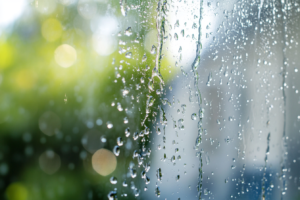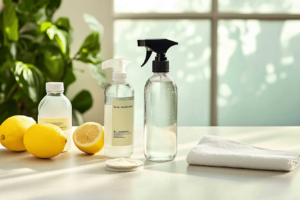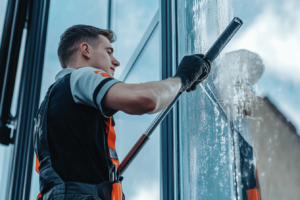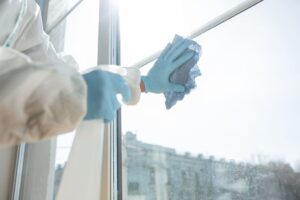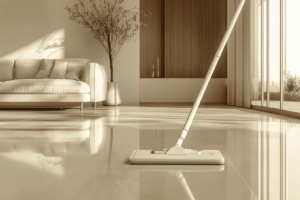Keeping windows spotless can be a challenge, especially when tap water leaves streaks and residue. That’s where pure water window cleaning comes in! This method ensures crystal-clear glass using purified water, without harsh chemicals. In this guide, the Wecasa professional cleaners will explain to you how it works, its benefits, and how to set up your own pure water cleaning system.
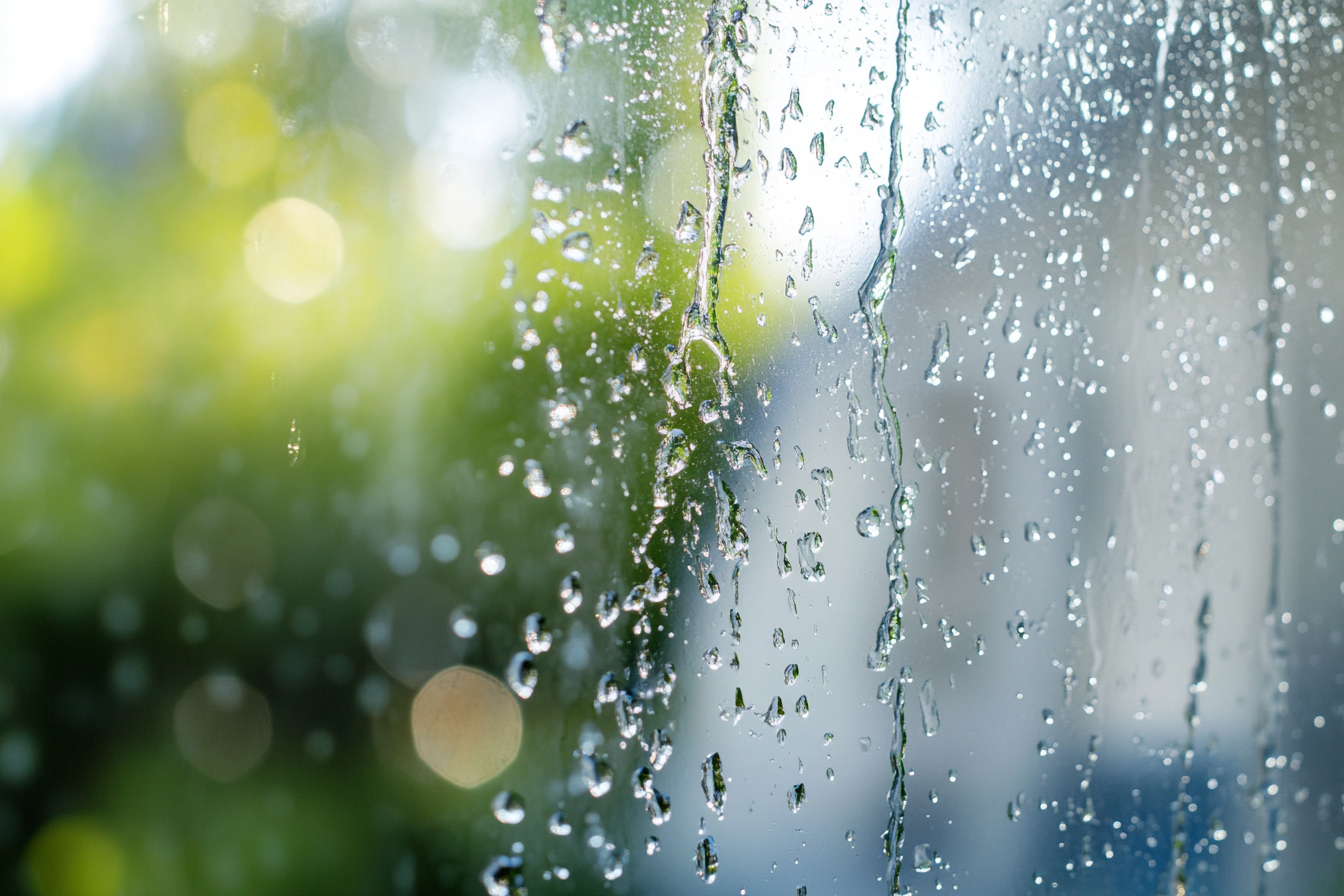
What is Pure Water Window Cleaning?
Pure water window cleaning utilizes completely demineralized water that has been stripped of all impurities, minerals, and dissolved solids. Unlike regular tap water, which contains various minerals that can leave spots and streaks, purified water provides a crystal-clear finish without any residue.
The Science Behind Water Purification
Pure water is created by removing dissolved solids through filtration. The two most common methods are:
- Deionisation (DI): This method uses resin filters to remove minerals and ions, producing ultra-pure water.
- Reverse Osmosis (RO): Forces water through a membrane to remove impurities before final DI filtration.
Both methods ensure that the water used for cleaning is free from contaminants, making it highly effective for streak-free results.
Essential Components of Pure Water Window Cleaning Systems
A complete pure water cleaning system consists of several key components:
- Water Fed Poles: Lightweight, telescopic poles that can extend up to 60 feet, allowing cleaners to reach high windows safely from the ground
- Filtration Systems: Including Deionization (DI) vessels and Reverse Osmosis (RO) systems that remove impurities
- Storage Tanks: Large capacity tanks to store purified water for continuous use
- Delivery Systems: Pumps and hoses that transport the pure water from storage to the cleaning area
How Does Pure Water Window Cleaning Work?
The process begins with standard tap water passing through a multi-stage filtration system:
- Initial filtration removes large particles and sediment
- Carbon filtration eliminates chlorine and organic compounds
- Reverse osmosis removes up to 98% of dissolved solids
- Final deionization achieves 100% pure water
Water purity is measured using a TDS meter, with readings ideally showing zero parts per million (PPM) for optimal cleaning results.
Benefits of Pure Water for Washing your Windows
The advantages of using purified water for window cleaning are numerous:
- Streak-free Results: No mineral deposits mean no spots or streaks after drying
- Environmental Benefits: No chemicals or detergents required, making it eco-friendly
- Enhanced Safety: Window cleaners can work safely from ground level
- Cost-effective: Reduced labor costs and no need for additional cleaning products
- Time-saving: Faster cleaning process with no need for hand-drying
How to make your own pure water for cleaning windows?
Creating your own pure water starts with measuring your tap water’s mineral content using a TDS meter. For optimal results, aim for a reading of 0.07 PPM or below.
A basic home setup requires connecting a DI vessel to your water source through a standard garden hose. The water flows through resin filters, removing minerals and impurities. Many people achieve better results by heating the filtered water, as warm pure water helps dissolve dirt more effectively.
Regular maintenance ensures consistent quality. Test your water’s purity before each use and replace the resin when TDS readings start to rise. Most homeowners need about 25 liters of pure water for a standard house clean, so plan your storage capacity accordingly.
For a more advanced setup, consider installing a reverse osmosis system before the DI vessel, particularly in areas with hard water above 100 PPM.
Choosing the Right Pure Water System
When selecting a pure water system, consider:
- Water Quality: Local water hardness affects filtration requirements
- Workload: Daily usage determines system capacity needs
- Mobility: Whether you need a vehicle-mounted or portable system
- Budget: Initial investment versus long-term benefits
Troubleshooting and Maintenance
Maintaining your system’s longevity requires consistent attention to detail and regular monitoring. It’s essential to check water quality daily using TDS meters and ensure filters and membranes are replaced according to manufacturer recommendations. Additionally, regular cleaning and inspection of equipment should be part of your routine maintenance schedule, with any issues being addressed immediately to prevent potential system damage and maintain optimal performance.
Several common issues may arise during the operation of pure water cleaning systems that require attention. Users might notice decreased water pressure or rising TDS readings, which can significantly impact cleaning effectiveness. Equipment wear and tear is also a natural occurrence that needs to be monitored and addressed. These issues, when identified early through regular maintenance checks, can be resolved before they develop into more serious problems that could compromise the system’s functionality.
Professional Tips and Best Practices
To achieve optimal results:
- Clean frames and sills first to prevent dirt run-off
- Use appropriate brush pressure for different surfaces
- Work in sections to ensure thorough cleaning
- Avoid cleaning in direct sunlight when possible
- Maintain consistent water flow for even cleaning
Weather considerations:
- Adjust cleaning techniques for different temperatures
- Be aware of wind conditions affecting water spray
- Plan work schedule around weather forecasts
Regular safety inspections and proper training form the foundation of a secure window cleaning operation. All operators must be thoroughly trained and equipped with appropriate personal protective equipment before beginning any work. Clear communication channels with property owners should be established and maintained throughout the cleaning process to ensure a smooth operation and address any concerns immediately.
Optimizing efficiency in pure water window cleaning operations requires a strategic approach to both planning and maintenance. By implementing detailed route planning and maintaining rigorous equipment maintenance schedules, cleaning teams can maximize their productivity. This efficiency is further enhanced through comprehensive staff training in best practices and the maintenance of detailed records, allowing for continuous improvement and operational excellence.
By following these guidelines and utilizing pure water cleaning systems correctly, window cleaners can deliver superior results while maintaining safety and efficiency.
Life gets busy, and finding the time and energy for household chores can be a challenge. That’s where Wecasa’s professional house cleaners come in! We’re just a few clicks away—ready to give your home the care it deserves. Book a cleaning session today, sit back, relax, and enjoy a spotlessly clean home in no time!


